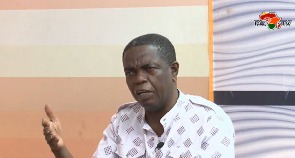According to a report by Ghanaweb, Veteran journalist and managing editor of the Insight Newspaper, Kwesi Pratt Jnr, has criticized former President John Dramani Mahama’s condemnation of Donald Trump’s alleged racist remarks, arguing that Mahama’s comments would be meaningless if he does not address the presence of a United States military base in Ghana.
Speaking on the issue, Pratt insisted that Ghana’s sovereignty must be defended in practical terms and not just through rhetoric.
According to him, any meaningful opposition to racism and imperialism must begin with the rejection of foreign military occupation, particularly by the United States.
“The Americans have a military base in Ghana, they control a significant portion of our military operations. What is more racist and neo-colonial than that?” Pratt said.
He questioned the sincerity of Mahama’s criticism of Trump, noting that former presidents and political leaders who facilitated or allowed such arrangements with foreign powers lack the moral standing to challenge systemic racism from Western leaders.
Mahama had earlier condemned a controversial remark allegedly made by Donald Trump, the former U.S. president, in which he reportedly referred to African countries in derogatory terms.
Mahama described the comments as “offensive, dehumanizing and a stark reminder of the deep-seated racism still prevalent in global leadership.”
However, Pratt argued that symbolic denunciations are not enough if they are not matched by firm political action.
“John Mahama’s reaction to Trump’s racism claim will mean nothing if the US military base remains on our soil,” Pratt said.
He further pointed out that the agreement which allows the U.S. military unrestricted access to certain facilities and exempts American personnel from Ghanaian laws was signed during the tenure of Mahama’s successor, but that the broader political establishment—including Mahama—has failed to take decisive action against it.
Pratt emphasized that real resistance to racism, imperialism, and white supremacy must involve rejecting foreign domination in all its forms, including military presence.
He called on Ghanaians to demand accountability from their leaders and to prioritize national sovereignty.
The issue of the U.S. military presence in Ghana has long sparked debate and controversy.
In 2018, Ghana signed a defense cooperation agreement with the United States which granted the U.S. military broad access to facilities and logistics in Ghana.
The agreement led to widespread protests at the time, with critics warning it compromised Ghana’s sovereignty.
Pratt’s comments revive these concerns and place renewed pressure on political leaders to revisit the terms of the deal.
He asserted that the continued presence of foreign troops on Ghanaian soil undercuts any stance against racial injustice coming from Western powers.
“To stand against racism, we must stand against every symbol and system of white domination—including military bases that compromise our independence,” he said.
As the discourse continues, many observers are now questioning whether Mahama and other leading politicians will respond substantively to these criticisms or continue to focus solely on the rhetoric of anti-racism, leaving structural issues unaddressed.
